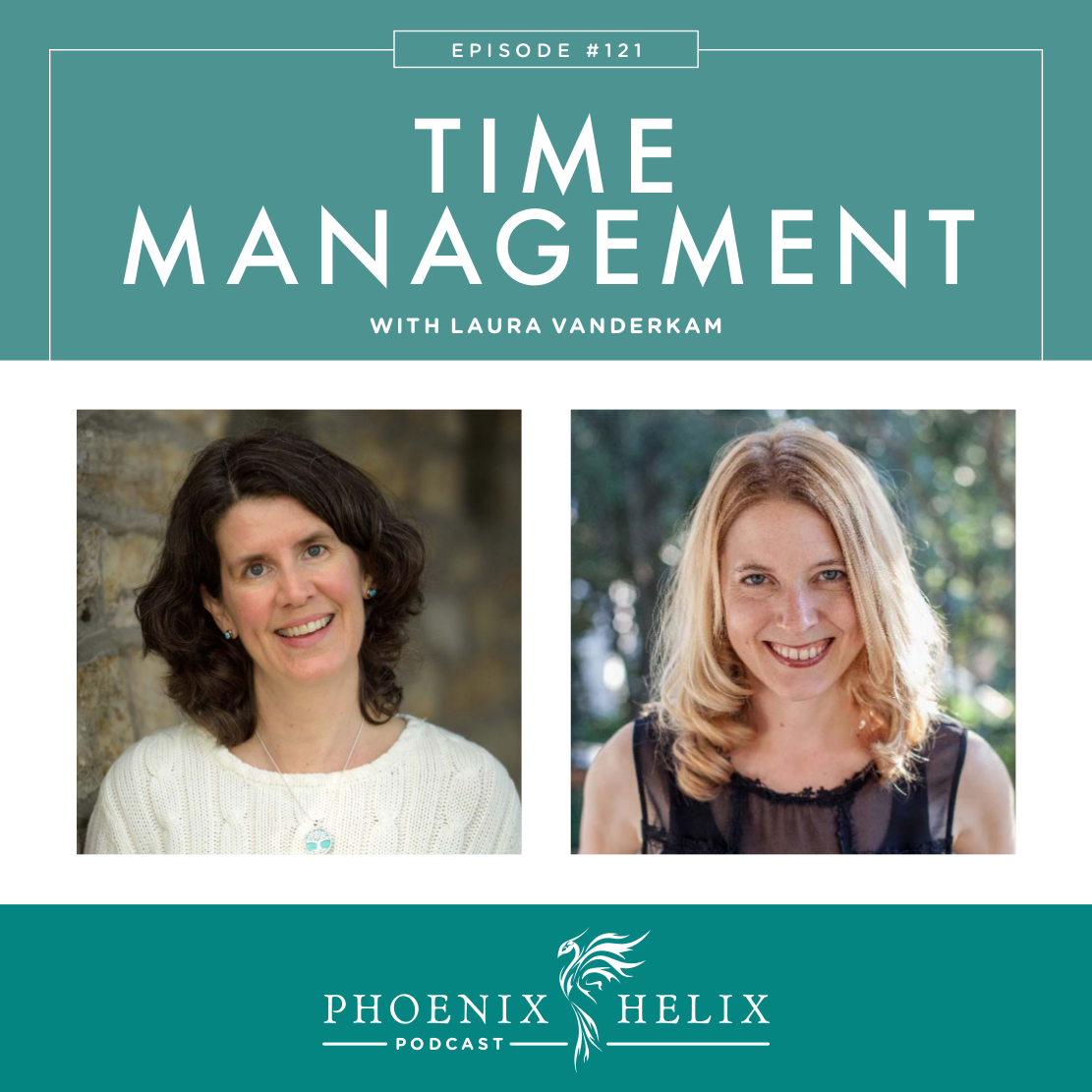Regaining Control of Our Time
Most discussions on time management focus on life hacks for productivity and efficiency, and while they make fun headlines, they have an interesting side effect. They often increase the feeling of stress and pressure, making us feel like we aren’t doing enough, that every minute should be filled, and any downtime is lazy. Today’s conversation is going to be different than that. We’re taking a big picture look at time. How can we gain clarity on where our time goes? How can we start to feel in control of time, rather than buffeted by it? What makes it slow down in some moments and speed up in others? Is it possible to be productive and feel relaxed at the same time? And how can we flex our expectations and our schedules when our health fluctuates? My guest is Laura Vanderkam, an author, speaker, and expert on the subject of maximizing time.
Listen to the Show
- Subscribe to my podcast through your favorite podcast app: iTunes, Stitcher, Google, TuneIn, Spotify, Amazon, etc.
- You can also listen to the episode right here through the player below, and if you subscribe to my newsletter you’ll get notified of future episodes.
Podcast: Play in new window | Download
Show Notes
- Intro & Meet Laura (0:00)
- Laura Vanderkam is the author of several books on time management, including Off the Clock: Feel Less Busy While Getting More Done. She’s also written a novella, Juliet’s School of Possibilities, that explores these ideas within the realm of fiction, too.
- Her TED Talk: How to Gain Control of Your Free Time has been viewed over 8 million times.
- She also hosts 2 podcasts: The Best of Both Worlds and Before Breakfast.
- Thank You to our Podcast Sponsor – Paleo on the Go (3:08)
- A frozen meal delivery service, 100% of their menu is compliant with the elimination phase of the paleo autoimmune protocol (AIP). They have over 5o items, including entrees, side dishes, broth, AIP-friendly bacon, and desserts.
- Use the code PHOENIX for 10% off your first order.
- What Is Time Stress? (4:58)
- The stories we tell ourselves about time dramatically impact how we perceive it. We look for evidence to support what we believe to be true.
- People who are highly productive, but don’t feel overwhelmed by the demands on their time, tell themselves this story: “I have enough time for the things that are important to me.”
- People who are stressed about time tell themselves a different story: “I have no time. I’m too busy.”
- What Are Time Diaries? (7:04)
- Step 1 in regaining control of your time is learning where it goes. Laura recommends tracking your time for a week. She has a spreadsheet available through her website if you sign up for her newsletter. You can also use a time tracking app, or simply write it down in a notebook. While this might seem like a big commitment, it only takes about 5 minutes per day.
- Most people will be surprised by the result, because we tend to overestimate how much time we spend doing certain things, and underestimate others. Once you have accurate information, you can make choices. What do you like about how you’re spending your time? What would you like to spend more time doing? What would you like to spend less time doing? Where can you make time trades?
- One obstacle to doing time diaries is a fear of discovery and self-judgment. Sometimes we don’t want to know if we’re “wasting time”. But everyone wastes time, even the most productive people. Time diaries give us the opportunity to see our time clearly and make conscious choices instead of unconscious ones.
- Setting Weekly & Quarterly Priorities (13:00)
- Laura recommends setting priorities in 3 areas: Self, Career, and Relationships. Every quarter, she sets 1 big goal for each area. Then on a weekly basis, she sets smaller priorities in each area (that match the larger goals), prioritizing time in her schedule to do them.
- Time management isn’t about planning the perfect schedule. Life is full of the unexpected, so schedules need to have space for the unexpected.
- Setting priorities lets you decide what will get done if everything else falls apart that week.
- It’s also important not to set too many priorities at once. That’s why Laura recommends one for each area. Next quarter, you can choose different priorities.
- Another important time management skill is learning to say no. Laura’s tip: When someone asks you to do something in the future, ask yourself if you would be willing to do it tomorrow. If the answer is yes, it’s something you really want to do. If the answer is no, remember that your future self is going to be just as busy as your current self. Just because your calendar looks clear now doesn’t mean it’s going to stay empty. Only say yes to things that match your priorities. (Resource: Podcast Ep. 118 – Boundaries and the Art of Saying No).
- The Power of Reflection (19:30)
- This is the partner to priorities. On a daily, weekly, quarterly, or yearly basis, you can reflect on how you actually spent your time. Where did and didn’t it match your priorities? What would you like to change going forward?
- Don’t beat yourself up over what’s past. Instead, focus on the future, which is full of possibilities to use your time differently.
- Also, don’t pursue perfection. We are human beings, and no one uses time perfectly. And that’s OK! The goal is to get better at using our time consciously.
- Making Time for Self-Care (21:33)
- Laura’s a big proponent of self-care. The better we care for ourselves, the more energy we will have, and the more we can accomplish with our time.
- With chronic illness, self-care (diet, sleep, exercise, stress management, mindset, etc.) maximizes our health and our abilities. There will still be some days when we are exhausted or experiencing a flare, and self-care helps us get those days. Prioritizing self-care a part of daily life minimizes those days as much as possible.
- Many people make the mistake of skimping on sleep to try to squeeze more hours into the day. This backfires in the long run. While there are some people who genetically require very little sleep, they are a rare minority (and certainly not people with chronic illness).
- Thank You to Our Podcast Sponsor: ShopAIP (26:15)
- I collaborated with ShopAIP to create a Phoenix Helix Bundle, which contains some of my favorite AIP pantry items. It’s a great way to sample their products!
- An online store, where everything sold is compliant with the elimination-phase of the Paleo Autoimmune Protocol. ShopAIP sells a wide variety of products, including protein bars, AIP-friendly spice blends, cooking and baking ingredients, snacks, non-toxic skincare, and more.
- If you’re a first-time customer, use the code PHOENIX for 10% off your order. Purchase here.
- Time Mantras (27:40)
- A mantra is a statement that’s repeated frequently. Most of us have time mantras that we say in our own minds, and often out loud as well, without consciously realizing it. These can have a positive or negative impact on stress levels.
- Stressing about time actually lowers productivity, because the stress we create is distracting and makes it difficult to focus. That’s why choosing a positive time mantra can be a powerful practice.
- Negative Time Mantras:
- “I’m busy.” – Laura recommends everyone stop saying, “I’m busy” in answer to the question, “How are you?” or “How was your weekend?” It says nothing about how we’re spending our time or what interests us. It’s just an expression of time stress that actually increases stress, because it’s a negative time mantra. Instead, be specific and share one of the ways you spent your time.
- “I have no free time whatsoever.” – This is almost never true. What people mean is that they don’t have as much free time as they want, and that’s very different. It raises questions: How can I create more free time in my life? How am I using my free time right now?
- “I don’t have time.” – We often use this one as an excuse to not do certain things. A more accurate statement is, “It’s not a priority.” It’s clarifying to realize the difference. Again, it opens up choices.
- Positive Time Mantras:
- “I have all the time in the world.” – This is a positive time mantra Laura used in her book, Juliet’s School of Possibilities. It creates a sense of abundance about time. Even though it isn’t completely true, when we behave like it is true, we’re much more relaxed as we approach the responsibilities of each day.
- “I will get done what I can get done. I have time for the things that matter to me.” – This is one of Laura’s personal favorites.
- “I’m not wasting time. I’m taking time.” – This is a favorite of Eileen. Sometimes her mind will tell her she’s “wasting time” when she’s relaxing or making time for self-care. This mantra reminds her that these activities are valuable, and she’s choosing them for a reason. It’s also helpful when a task takes longer than expected – it doesn’t mean that she’s doing something wrong. We notoriously underestimate how long things take. Lastly, we all waste some time in our day. This is a reminder that it’s a choice.
- Time Management for People with Chronic Illness (34:51)
- What we can accomplish in a day will vary based on our health. If we’re in remission, we can often accomplish a lot. If we’re experiencing an autoimmune flare, we need to adjust our expectations to the minimum and focus primarily on self-care.
- Laura recommends very short to do lists. Feeling productive is about expectations matching or exceeding reality. So, on challenging days, what are the 1 or 2 things that need to get done, with everything else being optional? You can also set your priorities for the week, and break those down into small tasks spread throughout the week. Do more on days when you’re feeling better, and give yourself grace on the days when you’re feeling limited.
- Don’t be afraid to delegate, ask for help, or hire help where you can. Just because something needs to get done doesn’t mean it needs to be done by you.
- Self-compassion supports health and productivity far more than self-judgment.
- Also, remember that small things done repeatedly do add up to big things. Laura shares the example of writing a book. That can seem like an overwhelming task, but just writing 300 words a day (1 page), adds up to a finished book draft in just 1 year. The same applies to other goals. We can break them down into small, manageable pieces.
- How To Slow Down Time (40:30)
- We’ve all had the experience of time seeming to slow down, and other times seeming to slip by unnoticed. There are things we can do to cultivate the feeling of time slowing down.
- Consciously savoring good moments is a powerful way to slow down time. They can be small things – playing with a child, noticing the flowers in the garden, laughter with a friend. Stop and consciously note to yourself that this is a good moment – save it in your memory by thinking of how you would describe this moment to someone else.
- Memories also expand our feeling of time, whereas routine slips from our memory. If you look back over the last quarter and don’t remember anything, that can be distressing that the time just disappeared. So, build small memorable adventures into your life on a daily, weekly, quarterly basis. A small example might be choosing to eat your lunch outside on a beautiful day as opposed to your desk. Or making plans to go to the theater, or a concert, or a beautiful local park. A larger adventure might be planning a vacation, as small as a weekend getaway or as large as dream vacation.
- Taking Breaks Improves Productivity (43:44)
- When Eileen is feeling stressed about time and everything that “needs to get done”, taking a 15 minute meditation break and then returning to work with a relaxed mindset helps her work more efficiently and effectively. When she says, “I don’t have time to meditate”, she ends up getting less done. (Resource: Podcast Ep. 91 – Meditation for Fidgety Skeptics).
- Laura writes about this in her books – taking breaks increases energy. “Powering through” without a break depletes energy, focus, and productivity. (Resource: Ultradian Rhythms).
- Laura’s Books (45:00)
- Laura has written numerous nonfiction books on time management. But if you’re more of a fiction lover, she recently published a time management fable called: Juliet’s School of Possibilities. Laura believes that stories express truth often more powerfully than facts, and stories are often what inspire people to make positive changes in their life.
- Outro (50:11)
- You can keep up with Laura and her work through her website. There you’ll find information about her books, podcasts, and TED talk, and she also writes a blog. You can also find her books on Amazon and bookstores worldwide.
- Eileen (your podcast host) is the author of multiple books, written to help people thrive with autoimmune disease. Learn more on the Books Page.
- If you like this podcast, follow or subscribe through your favorite podcast app. You can also subscribe to Eileen’s biweekly newsletter.
- Check out the entire archive of podcast episodes.
You May Also Be Interested In
Spreading the Word
If you like the podcast, please leave a positive review in iTunes. It would mean the world to me, and also helps others find the podcast. Here are some quick instructions using your iPhone:
- If you are already subscribed to my podcast: (1) Click the purple podcast icon. (2) At the bottom of the screen, click Library. (3) At the top of the screen, click Shows. (4) Click the Phoenix Helix podcast image. (5) Scroll down the page, and you’ll see Ratings and Reviews. Scroll down a little bit more and click on Write a Review. This will bring up the review screen. Tap 5 stars (if you love the podcast), and then click in the title box, and it will bring up the keyboard. Enter a title and short review. (6) Click Send in the upper right corner. (7) Thank you! Positive reviews give the podcast a higher search ranking in iTunes, helping people find it and letting them know it’s a quality podcast and worth their time to listen.
- If you haven’t subscribed to my podcast: (1) Click the purple podcast icon. (2) In the lower right corner, click the magnifying class. (3) Type Phoenix Helix in the search box. (4) Click the podcast cover in the Show list. (5) If you’d like to subscribe, click the + sign at the top of the screen. (6) To write a review, scroll down the page, and you’ll see Ratings and Reviews. Scroll down a little bit more and click on Write a Review. This will bring up the review screen. Tap 5 stars (if you love the podcast), and then click in the title box, and it will bring up the keyboard. Enter a title and short review. (7) Click Send in the upper right corner. (8) Thank you! Positive reviews give the podcast a higher search ranking in iTunes, helping people find it and letting them know it’s a quality podcast and worth their time to listen.








